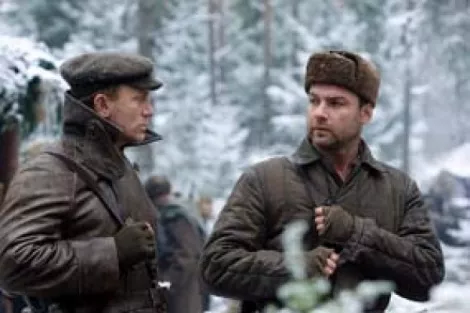
Because while the details may be relatively original for Hollywood moviemaking, the structure and the Hollywoodized template of the tale are pretty standard. That isn’t always a bad thing. Hollywood makes it easy to decry Hollywood filmmaking, but every once in a while, a studio film reminds us why studio films got so popular in the first place. They can be rousing and inspiring entertainments that feel archetypal rather than clichéd. “Standard” doesn’t just mean “ordinary” or “average”; it can also signify the pinnacle of how something can be done.
nSo, if it’s a little bit Robin Hood-ish when one of the heroic Bielski brothers, Asael (Jamie Bell), says, “We know these woods. They’ll never find us in here”—well, that’s just fine. What he and his brothers, Tuvia (Daniel Craig) and Zus (Liev Schreiber), are stealing from the powerful Nazis are people—fellow Jews—and what they are giving the “poor” is themselves, not only their own lives but a sense of hope and a way to carry on in a terrible situation.
nThe track of where their story goes is inevitable, even if it doesn’t always feel that way. Of course, their refuge deep in the dense forests cannot be safe forever from such persistent pursuit, and we know that someone had to survive this horror to tell the tale—the movie is based on Nechama Tec’s nonfiction book Defiance: The Bielski Partisans. But there are more than a few intense moments when it’s hard to see how anyone survived.
nIt’s those details—which Zwick lavishes over in a way that is both loving to ensure their richness, and sparse to avoid bringing the plot to a standstill—that make the story sing. Some are not unfamiliar: thematic explorations into how one copes with traitors and collaborators, how one struggles not to become like the monstrous enemy one is fighting, how life goes on even amid deprivation, sickness and endless fear. Others are more surprising. Craig navigates Tuvia through a land mine of personality—he’s a petty criminal used to people treating him like dirt, but he comes into his own as a natural leader. He’s a hard man with an unexpected soft touch, one who cannot turn away anyone who needs help, yet there comes a moment when you begin to wonder whether Tuvia hasn’t gone as soft as a man like him can go. And then, oof! The film—and Craig—smack you across the face.
nSome of the details are bittersweet. Two brainy types, a teacher and a publisher, cheerfully argue politics and philosophy even as they engage in what is probably the most taxing physical work they’ve ever done in their lives. (It takes a lot of hands to build a village from scratch.) Most of the details, however, are more bitter. A rabbi in a Nazi ghetto, who rejects Tuvia’s offer of escape, says, “We’re waiting for G-d.” There’s also a moment when Schreiber’s grief-stricken Zus does something that feels so utterly spontaneous, I had to wonder whether Schreiber improvised it. If he did, he’s a far more dangerous actor than I’ve ever given him credit for. And if he didn’t, then he has only proven, again, how unforced his forceful naturalness is.
nBut bitter is not the feeling Defiance leaves you with in the end. It’s hopefulness—even as we can’t forget that we haven’t learned our lessons from such events at all.
nDEFIANCE
n
nDaniel Craig, Liev Schreiber, Jamie Bell
nRated R
Defiance trailer:
n